What makes someone evil? What makes evil monstrous? Are there ever good reasons for violence? In what context? These and more questions are mused on by Kabaret, a dark fantasy visual novel from Malaysian Persona Theory. Journey into the Alam with Jebat and provide tasseomancy services to the dwellers of the Kabaret in an effort to gather information on how to break his curse, and maybe lose yourself along the way. Kabaret is dark but quite successful at challenging the player to think through their conceptions about right versus wrong, good versus evil, and what makes us monsters, especially in the current global political climate.
In Kabaret, the titular Kabaret is where monsters from Southeast Asian myths and folklores dwell alongside ghosts and other visiting figures. One note of warning, Kabaret has a number of scenes which could be problematic for folks with photosensitivity so if that is of concern you might want to skip out on playing the game and watch a stream first to see if it will work for you with proper precautions in place.
The game is also very violent, with multiple scenes of gore (including decapitation and amputation of limbs), plus discussion and depiction of a number of topics that could be difficult for some players like murder, genocide, sexual assault, abuse, mental health and suicide (specifically hanging), and war (which I will discuss more below). While the game does not sensationalize these topics, certain scenes are repeating throughout (like the hanging) and could be triggering for players so just know that going in!
Players begin the game as Jebat, a 25ish year old human food delivery man who is, I’ll cut right to it, a huge jerk. He’s nihilistic and doesn’t care about anyone other than himself, except maybe his adoptive mother Li Wen, and barely at that. Though he worries about her taking her meds (she hears and talks to voices), he’s not really all that great in his interactions with her. This of course foreshadows her death when he returns home from a pau delivery and finds her dead and then leaves her there because he doesn’t know how to respond… The game proceeds from there with more violence, as he does nothing when the pau seller he delivers for is killed by two bandits. Yikes.
Out from nowhere comes Garuda (a Hindu demigod), one of our first mythical figures, who kills the bandits and then kills Jebat for his lack of action to save the pau seller. Throughout this first chapter, players are prompted to pick one of three dialogue/reaction choices and these will impact the overall vibe of Jebat’s character.
(Un)fortunately for Jebat, he wakes up as a scaled monster (for those familiar, a naga) and saved by the Kabaret’s caretaker, a harimau jadian (Malay were-tiger) who explains what the Kabaret is and tasks him with serving tea to the dwellers. Maybe by talking to the other dwellers, Jebat will be able to resolve his curse. (Or maybe not?)
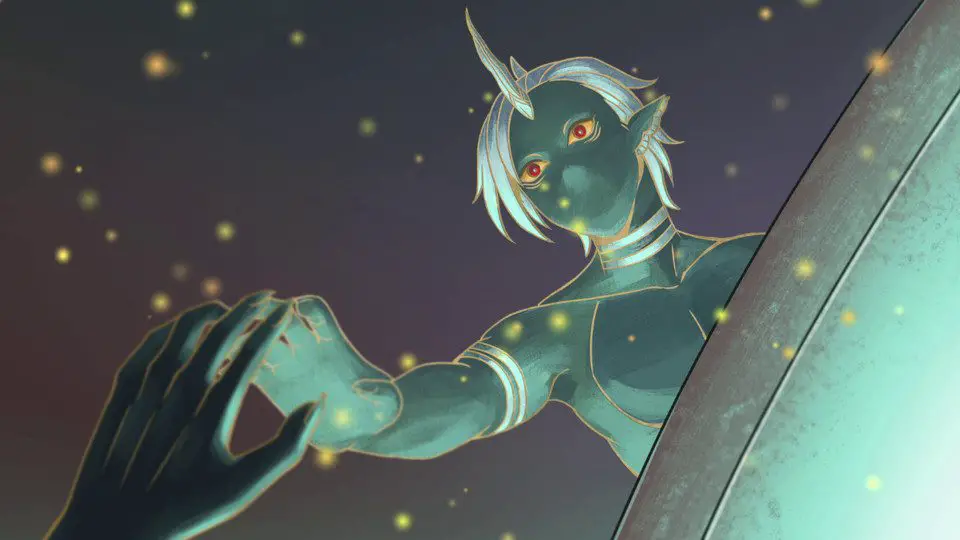
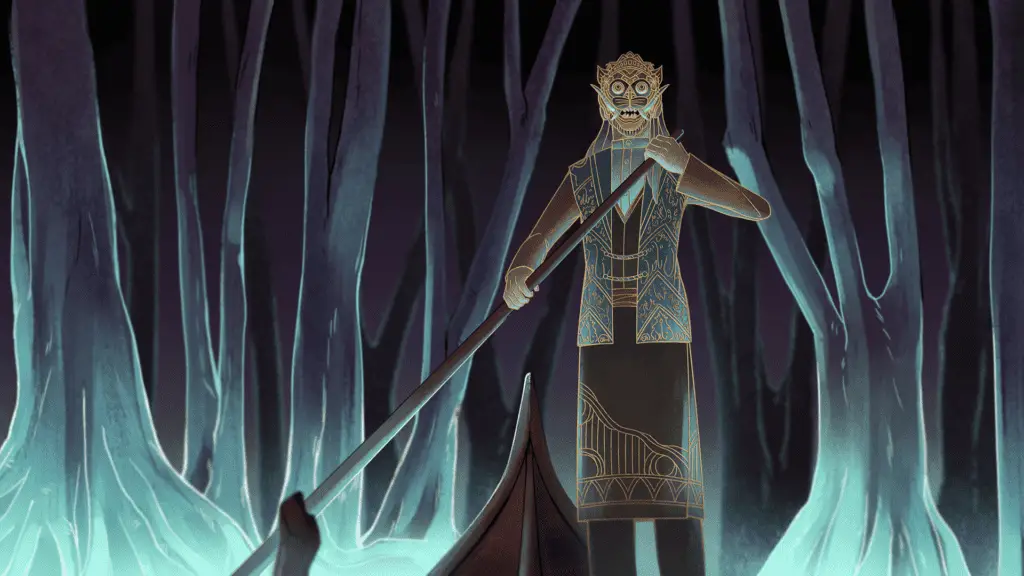
Jebat, the Caretaker, and all other characters are illustrated in this absolutely gorgeous cross between cloisonné (a technique for decorating metalwork with pieces held together by stripes of wire or gold) and batik (an Indonesian technique of wax-resist dying applied to the whole cloth). This design is a change from the first demo and I am a big fan. The art in the original was gorgeous and the gold lines on each figure bring them to life while continuing to connect with the SEAsian setting of the game itself.
Now if you’re worried about the different creatures and figures, don’t. One of the best parts of the game is the journal that Jebat is given by the Caretaker, actually that of the previous Tea Master (which is another mystery of its own). As you meet characters, learn more about the tea recipes, how to play the minigames, and move through chapters, the journal updates with information for you.

The majority of the time, Jebat is making tea for different characters. Pay attention to their faces and what they ask for. Sometimes what they want isn’t what they need. As you make more recipes, they’ll be in the journal, which is very helpful moving forward. Most of the time each character will get three cups of tea (assuming you don’t completely botch the first and second round).
You also can’t whiz through tea making. Each and every time you will pick three ingredients, place them in the tea pot, pour into the cup, pour from that cup into Radan’s statue, then pour into the cup, before placing the cup on the platter for the character. This forces you to sit and think through what’s going on in the game. The slowness by itself will either bore you or not have an impact on you. Considering the importance of tea and tea ceremonies in Southeast Asian (and many more) cultures, I think it’s a very reflective type of game play and I enjoyed it.
In each interaction, Jebat and the player will learn more about the various dwellers, which will be important later. In fact, the game has seven distinct endings (based on achievements), so it’s important to pay attention to what happens in one playthrough.
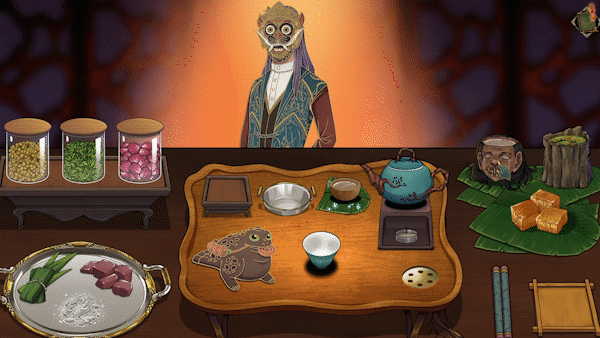
Especially because there are no save points! Unlike most visual novels, you can’t go back and try a branch point again. Instead, you’ll have to play the entire game through each time. This is one of the only drawbacks for me. I’m completely fine being set up to play the first time from beginning to end, but I do think it would be nice to after the first full playthrough be able to jump in at different points. Or let me skip dialogue that I’ve already seen (which would also mean less of the stuff that I don’t actually want to see multiple times).
There’s also no CG gallery or extras, so if you want to save something for a wallpaper or to look at later, screenshot as you go. (There are some gorgeous moments as the game progresses with different characters and I wish I could go back to look at the art.) The game does autosave and will indicate as such in the top right corner.
Gameplay includes three other minigames. Congkak, which many will know as mancala, where you aim to catch more seeds than the other and guli (marbles), where you try to get as many of the marbles out of the gelanggang (arena) provided except if you knock out the breaker guli, you’ll lose a life.
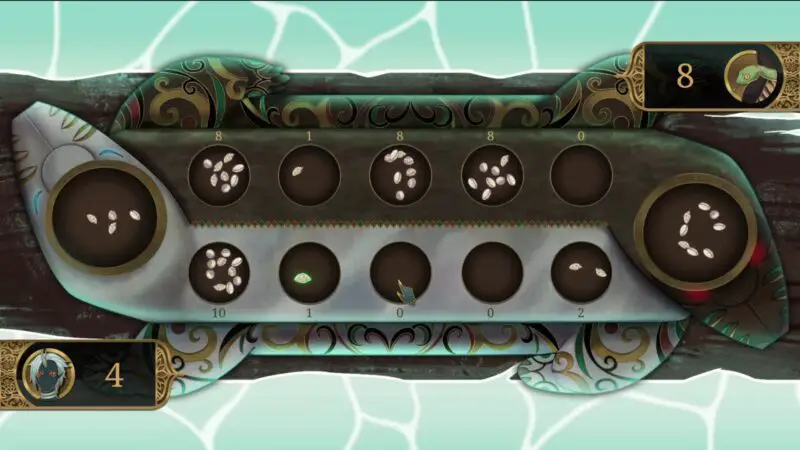
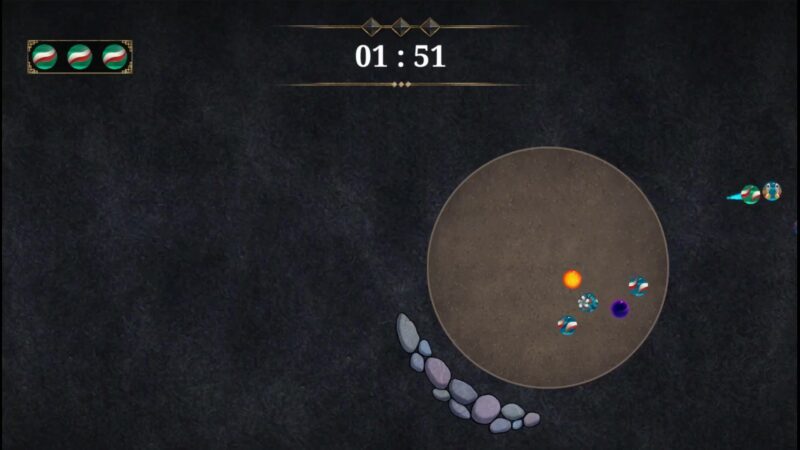
Congkak was more successful for me mostly because I just really am not good at Guli, which meant that I lost out on some interactions like saving one character by feeding her a baby. Good times.
Finally there’s Nabau’s performances. Jebat must control the spotlight, smoke machine, and explosions to do well. The better you do, the better the outcome. Each of these performances features a song by Indonesian ethnic music fusion group SambaSunda and the rest of the game is scored with Southeast Asian instruments and sounds, further immersing the player in the Alam. At one point I just left the game open to run through the score.
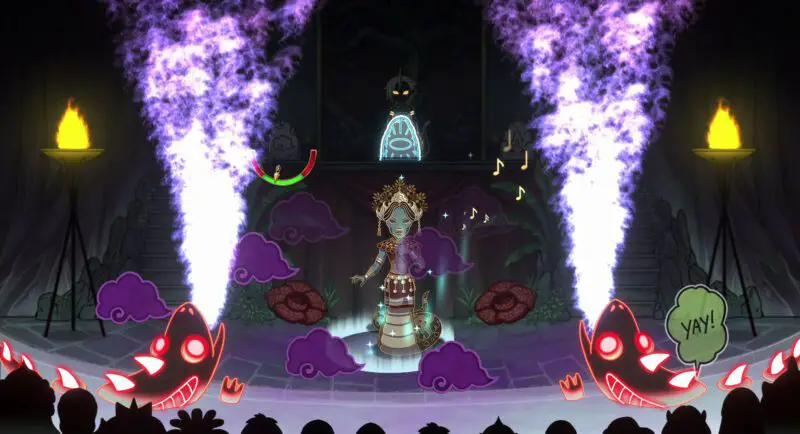
Kabaret progresses henceforth with Jabet meeting characters, serving them tea, playing Congkak and Guli, and the player trying not to screw it up along the way. Depending on your choices, Jebat will absolutely screw things up out of his selfishness, or learn to not being a complete dingus. Fortunately, if you choose to play it that way, Jebat learns to grow into a better version of himself and make choices that don’t impact just him. There’s also a slight romance subplot but this is not a dating visual novel. Who you get closer to does unlock scenes you won’t get in every playthrough so if you’re a completionist, try to get close to one of the women each time.
Kabaret Thrives In the Unanswerable
The strength of Kabaret is actually its narrative. While the tea ceremony is definitely fun and I liked seeing the facts about the different ingredients, I was really in it for the story which the tea ceremony only further supports. The game does not shy away from violence in Malaysian and East Asian history, like with ghosts who were murdered by Japanese soldiers in the invasion of Malaya existing aside two of those soldiers, including a kamikaze.
At the same time players meet Tikbalang, a Philippine werehorse who misses terrorizing the Spanish who were colonizing the Philippines. On the flipside, the actual crux of the conflict between Jebat (and his ancestors) and Geruda is mythological in nature, with Geruda killing all of the Nagas because of violence against his mother. Mayang is a sea princess who no longer has followers while Rosie is a zombie piloted by a snake.
Who is the “bad guy”? Do they all deserve to be monsters just because they aren’t human? The ghosts of course are unhappy dwellers and shouldn’t have been killed. And what about the Minister who is fully human but also has a creepy rude jinn as her protective spirit? She’s above in the real world sacrificing who I assume are the Orang Asli and Orang Asal (Indigenous Malaysians) to keep the dwellers happy so that she can win the election for the next Caretaker who will rule for another 40 years. Was Li Wen wrong for asking the gods for a child? Or doing what she needed to raise Jebat who as you’ll learn in the game, needs human flesh to live? (He just had no idea…)
Which brings us back to the start of the story with our Harimau Caretaker taking Jebat into the Kabaret in the first place! What are his goals and wishes? Is he any better than the others just because he “keeps the peace?”
I can’t answer these questions for you or any other players. The true gift of Kabaret is that it keeps you thinking without trying to push one narrative (hah) over another.
Personally I think Tikbalang is great and did in fact tell him to go back out in the world to screw with colonizers some more (though other characters told Jebat that was not the smartest choice since he’s a Caretaker supporter, whoops).
Situating Kabaret firmly in SEAsian myths and history brings the game to life in a way only focusing on the creatures and folklore would not. The stakes are much higher when the monsters the Caretaker must preside over are those who were once human and had no choices (like Kuman Thong, a fetus turned into a protective charm by his father) or the actual literal baby wailing away. Geruda, the Naga, and other figures may be mythological in nature but they’re made very real and realistic in their portrayals by the Persona Theory.
Geruda is especially one of the most complex characters. A demi-god stuck doing the bidding of the other Gods, violent in nature and linked to Vishnu the Hindu god who fights injustice… There’s a whole lot happening with him, and the conversation he has with Jebat near the end of the game is one of the best ones, especially with his musings on humans interacting with one another. The back and forth between characters also propels Jebat to be slightly less awful by the game’s end, depending on your choices.
As a huge proponent of diversely led and set visual novels, I hope we’ll see more games like Kabaret from Persona Theory and other developers.
It takes roughly 5-7 hours to finish a playthrough and with multiple endings to find, the $19.99 price is great. I’m excited to try to get a different ending the next time that I play.
Images and review copy courtesy of Persona Theory
Have strong thoughts about this piece you need to share? Or maybe there’s something else on your mind you’re wanting to talk about with fellow Fandomentals? Head on over to our Community server to join in the conversation!

